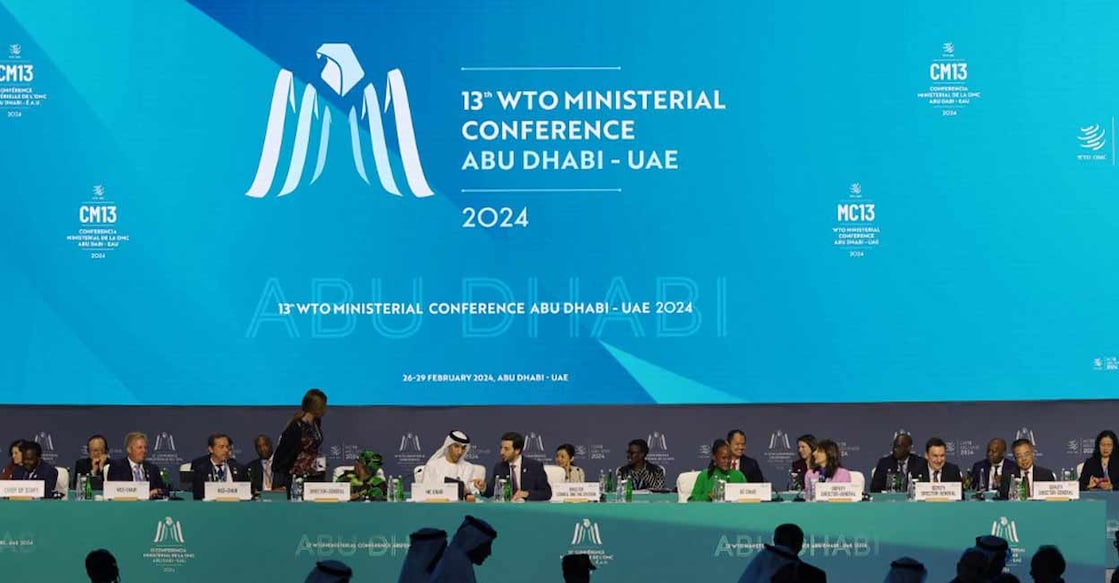India calls for revival of WTO’s Appellate Body

Mail This Article
The 13th Ministerial Conference (MC13) of the World Trade Organisation (WTO) was held in Abu Dhabi, United Arab Emirates.
The Ministerial Conference is the WTO’s top decision-making body.
The Marrakesh Agreement establishing the WTO instructs members to hold one at least every two years.
At these gatherings, ministers from across the world review the current work of the WTO, take decisions on issues which the WTO delegations have put before them and, if appropriate, may take action to bring new members into the WTO.
India said that restoration of the fully functional dispute settlement system of the WTO is the top-most priority.
The Appellate Body of the system had been non-functional since December 2019 due to the blocking of the appointment of its members or judges by the US and this had called into question the WTO’s overall credibility and the rules-based trade order it upholds.
India called for the restoration of the Appellate Body as the top-most priority of any reform process, along with effective formalisation of the ongoing informal dispute settlement reform discussions among some members at the WTO.
What is the WTO?
• The World Trade Organisation (WTO) is the only global international organisation dealing with the rules of trade between nations.
• The overall objective of the WTO is to help its members use trade as a means to raise living standards, create jobs and improve people’s lives.
• At its heart are the WTO agreements, negotiated and signed by the bulk of the world’s trading nations and ratified in their parliaments. The goal is to ensure that trade flows as smoothly, predictably and freely as possible.
• The WTO came into being on January 1, 1995. But its trading system is half a century older. Since 1948, the General Agreement on Tariffs and Trade (GATT) had provided the rules for the system. Whereas GATT had mainly dealt with trade in goods, the WTO and its agreements cover trade in services, and in traded inventions, creations and designs (intellectual property).
• The headquarters of the WTO is situated in Geneva, Switzerland.
• The WTO provides a forum for negotiating agreements aimed at reducing obstacles to international trade and ensuring a level playing field for all, thus contributing to economic growth and development.
• It also provides a legal and institutional framework for the implementation and monitoring of these agreements, as well as for settling disputes arising from their interpretation and application.
• The WTO currently has 166 members, accounting for 98 per cent of world trade. A total of 25 countries are negotiating membership.
• During the 13th WTO Ministerial Conference (MC13) in Abu Dhabi in February 2024, WTO membership of Comoros and Timor-Leste were approved taking the total number of members to 166.
• The WTO’s top level decision-making body is the Ministerial Conference, which meets usually every two years.
• WTO activities are supported by a Secretariat led by the WTO Director-General. The Secretariat is located in Geneva, Switzerland.
• The General Council meets regularly to carry out the functions of WTO. It has representatives (usually ambassadors or equivalent) from all member governments and has the authority to act on behalf of the ministerial conference which only meets about every two years.
Dispute settlement mechanism of WTO
• Resolving trade disputes is one of the core activities of the WTO. A dispute arises when a member government believes another member government is violating an agreement or a commitment that it has made in the WTO.
• The WTO has one of the most active international dispute settlement mechanisms in the world. Since 1995, 622 disputes have been brought to the WTO and over 350 rulings have been issued.
• Bilateral consultations between the parties are the first stage of formal dispute settlement. They give the parties an opportunity to discuss the matter and to find a satisfactory solution without resorting to litigation.
• Only after such mandatory consultations have failed to produce a satisfactory solution within 60 days may the complainant request adjudication by a panel. Even when consultations have failed to resolve the dispute, it always remains possible for the parties to find a mutually agreed solution at any later stage of the proceedings.
• Although the panel report contains the findings and conclusions ruling on the substance of the dispute, it only becomes binding when the Dispute Settlement Body has adopted it.
• If a party has notified its decision to appeal, the panel report cannot be adopted, given that the Appellate Body could modify or reverse it. If there is no appeal by either party, the Dispute Settlement Body is obliged to adopt the report.
• The Appellate Body is composed of seven Members who are appointed by the Dispute Settlement Body to serve for four-year terms. Each person may be reappointed for another four-year term. Each member of the Appellate Body is required to be a person of recognised authority, with demonstrated expertise in law, international trade and the subject-matter of the covered agreements generally. They are also required to be unaffiliated with any government and are to be broadly representative of the membership of the WTO.
• The Appellate Body has its seat in Geneva, Switzerland.
• Currently, the Appellate Body is unable to review appeals given its ongoing vacancies. The term of the last sitting Appellate Body member expired on November 30, 2020.




